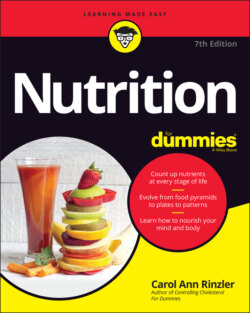Читать книгу Nutrition For Dummies - Carol Ann Rinzler - Страница 75
Energy for work
ОглавлениеYour second largest chunk of energy after the REE is the energy you spend on physical work, everything from brushing your teeth in the morning to planting a row of petunias in the garden or working out in the gym.
Your total energy requirement (the number of calories you need each day) is your REE plus enough calories to cover the amount of work you do.
Does thinking about this use up energy? Yes, but not as much as you’d like to imagine. To solve a crossword puzzle, or write a chapter of this book, the average brain uses about 1 calorie every four minutes. That’s only one-third the amount needed to keep a 60-watt bulb burning for the same length of time.
Table 5-2 defines the energy level of various activities ranging from the least energetic (sleep) to the most (playing football, digging ditches). Table 5-3 shows how to make these numbers personal.
TABLE 5-2 How Active Are You When You’re Active?
| Activity Level | Activity |
|---|---|
| Resting | Sleeping, reclining |
| Very light | Seated and standing activities, painting, driving, laboratory work, typing, sewing, ironing, cooking, playing cards, and playing a musical instrument |
| Light | Walking on a level surface at 2.5 to 3 mph, garage work, electrical trades, carpentry, restaurant trades, housecleaning, child-care, golfing, sailing, and table tennis |
| Moderate | Walking 3.5 to 4 mph, weeding and hoeing, carrying a load, cycling, skiing, tennis, and dancing |
| Heavy | Walking with a load uphill, tree felling, heavy manual digging, basketball, climbing, football, and soccer |
| Exceptionally heavy | Professional athletic training |
The National Research Council, Recommended Dietary Allowances (Washington, D.C.: National Academy Press, 1989)
TABLE 5-3 How Many Calories Do You Need to Do the Work You Do?
| Activity Level | Calories Needed for This Work for One Hour |
|---|---|
| Very light | 80–100 |
| Light | 110–160 |
| Moderate | 170–240 |
| Heavy | 250–350 |
| Exceptionally heavy | 350+ |
“Food and Your Weight,” House and Garden Bulletin, No. 74 (Washington, D.C.: U.S. Department of Agriculture)
